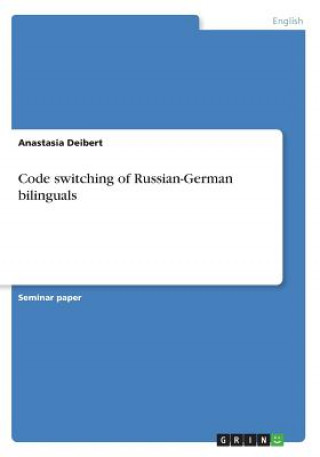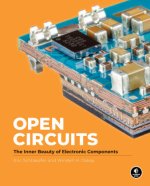
Kód: 13498272
Code switching of Russian-German bilinguals
Autor Anastasia Deibert
Seminar paper from the year 2007 in the subject English Language and Literature Studies - Linguistics, grade: 1,7, University of Stuttgart (Institut für Linguistik/ Anglistik), course: Code Switching, 7 entries in the bibliography ... celý popis
- Jazyk:
 Angličtina
Angličtina - Vazba: Brožovaná
- Počet stran: 20
Nakladatelství: Grin Publishing, 2016
- Více informací o knize

Mohlo by se vám také líbit
-

Freethinking Cultural Nationalist
1076 Kč -

Lantern for Lent
751 Kč -

Abrazo
1198 Kč -

Inseminacao artificial post mortem
1234 Kč -

Terres de lloguer
320 Kč -

Die Flutsagen
486 Kč
Dárkový poukaz: Radost zaručena
- Darujte poukaz v libovolné hodnotě a my se postaráme o zbytek.
- Poukaz se vztahuje na celou naši nabídku.
- Elektronický poukaz vytisknete z e-mailu a můžete ihned darovat.
- Platnost poukazu je 12 měsíců od data vystavení.
Více informací o knize Code switching of Russian-German bilinguals
Nákupem získáte 104 bodů
 Anotace knihy
Anotace knihy
Seminar paper from the year 2007 in the subject English Language and Literature Studies - Linguistics, grade: 1,7, University of Stuttgart (Institut für Linguistik/ Anglistik), course: Code Switching, 7 entries in the bibliography, language: English, abstract: In the following pages I want to focus on the code switching of Russian-German bilinguals. The phenomenon of code switching has its origin in the research of bilingualism and code switching can be examined from different perspectives. There are grammatical or syntactic, sociolinguistic or pragmatic, conversational and psycholinguistic aspects of code switching. In which situations is code switching possible or probable? Where does code switching seem to be possible syntactically? Why do speakers code-switch? Do bilingual speakers behave in another way in different social situations?§Firstly, I will give some definitions of the term "code switching" and I will define the various types of code switching. In addition, I will concentrate on Shana Poplack's grammatical constraints and on Carol Myers-Scotton's Matrix and Embedded Language theory. The next chapter will deal with my case study. First of all, I will name some relevant characteristics of Russian and then the procedure of the case study will be presented. Afterwards, while analysing my collected data I will try to find similarities as well as differences with regard to Poplack's and Myers-Scotton's theories and I will take a look at the functions of code switching. The conclusion will comprise the main points and some suggestions for further discussion.§Up to now many researches on code switching were undertaken. As a consequence, various definitions and types of code switching can be found throughout the history of research on code switching. In this chapter I will concentrate on two of the major theories of code switching - on Poplack's and Myers-Scotton's code switching theories. Code switching is the term for different languages coming into contact with one another in a conversation. This could be a general definition for code switching. Bilingual or multilingual speakers, people who possess two or even more languages, normally tend to code-switch, that means that they change from one language to the other and use words and phrases from distinct languages.§According to Wei (2000, 16) code switching occurs "when a bilingual talks to another bilingual with the same linguistic background and changes from one language to another in the course of conversation". Poplack (2000, 224) defines code switching as "the alternation of two languages within a single discourse, sentence or constituent".
 Parametry knihy
Parametry knihy
1042 Kč
- Plný název: Code switching of Russian-German bilinguals
- Autor: Anastasia Deibert
- Jazyk:
 Angličtina
Angličtina - Vazba: Brožovaná
- Počet stran: 20
- EAN: 9783668222533
- ISBN: 3668222533
- ID: 13498272
- Nakladatelství: Grin Publishing
- Hmotnost: 44 g
- Rozměry: 210 × 148 × 1 mm
- Datum vydání: 14. June 2016
Oblíbené z jiného soudku
-

Haunting Adeline
617 Kč -

Berserk Deluxe Volume 1
1033 Kč -

Berserk Deluxe Volume 3
1138 Kč -

Berserk Deluxe Volume 2
1033 Kč -

Atomic Habits
340 Kč -

White Nights
90 Kč -

Powerless
276 Kč -

Hunting Adeline
633 Kč -

Berserk Deluxe Volume 5
1115 Kč -

Iron Flame
353 Kč -

Harry Potter and the Prisoner of Azkaban (Minalima Edition)
673 Kč -

Cry Baby Coloring Book
256 Kč -

House of Leaves
405 Kč -

Gravity Falls Journal 3
440 Kč -

Dune
200 Kč -

Heaven Official's Blessing: Tian Guan Ci Fu (Novel) Vol. 2
441 Kč -

Dune Messiah
178 Kč -

Twisted Lies
276 Kč -

Berserk Deluxe Volume 4
1165 Kč -

The 48 Laws of Power
530 Kč -

Heaven Official's Blessing: Tian Guan Ci Fu (Novel) Vol. 1
426 Kč -

Berserk Deluxe Volume 6
1086 Kč -

A Little Life
276 Kč -

Surrounded by Idiots
256 Kč -

Twisted Games
276 Kč -

Bungo Stray Dogs, Vol. 8 (light novel)
389 Kč -

CHAINSAW MAN V14
250 Kč -

48 Laws Of Power
471 Kč -

Court of Thorns and Roses
218 Kč -

Court of Mist and Fury
221 Kč -

No Longer Human
330 Kč -

Children of Dune
174 Kč -

Solo Leveling, Vol. 1
461 Kč -

Icebreaker
254 Kč -

SOLO LEVELING V08
450 Kč -

Percy Jackson and the Olympians 5 Book Paperback Boxed Set
911 Kč -

Heaven Official's Blessing: Tian Guan Ci Fu (Novel) Vol. 3
410 Kč -

The Creative Act
586 Kč -

Solo Leveling, Vol. 2
448 Kč -

Solo Leveling, Vol. 3
402 Kč -

Before the Coffee Gets Cold
191 Kč -

Caraval Paperback Boxed Set
906 Kč -

The Prisoner's Throne
238 Kč -

Fourth Wing
351 Kč -

Avatar, the Last Airbender: The Kyoshi Novels (Box Set)
676 Kč -

Dune
214 Kč -

Dune Messiah
220 Kč -

Open Circuits
861 Kč -

English File Upper Intermediate Multipack A (4th)
530 Kč
Osobní odběr Praha, Brno a 12903 dalších
Copyright ©2008-24 nejlevnejsi-knihy.cz Všechna práva vyhrazenaSoukromíCookies



 Vrácení do měsíce
Vrácení do měsíce 571 999 099 (8-15.30h)
571 999 099 (8-15.30h)